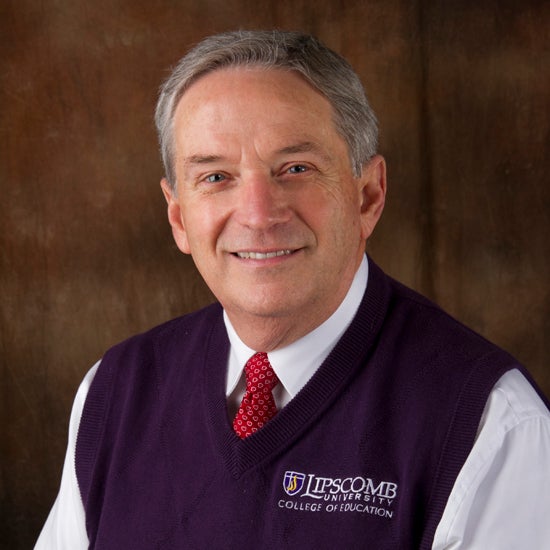After 50 years in education, a teacher, principal, professor and department chair completes his career at his alma mater
Junior High shares what he’s learned and loved after five decades in education
Cate Zenzen |

High with his wife, three sons, and their families.
Junior High, Chair and Professor of the College of Education at Lipscomb University, retired this May after a 50-year career in education. A 1970 alumni of what was then David Lipscomb College, High spent much of his career as a teacher and principal before returning to Lipscomb as a professor and later department chair.
Despite his unique name, High did not grow up knowing he would work in education. Born in 1948, he attended a one-room schoolhouse in Tompkinsville, KY -- a small town with no junior or senior high school. It wasn’t until he attended David Lipscomb College and met his wife, a fellow student and education major, that he considered teaching.
“When I went to college it was not clear as to what I wanted to do. I tried an education course that allowed me to work with kids and found I really enjoyed working with younger ones,” said High.
High and his wife were both offered teaching positions in the Nashville school system, and he started his career as a teacher at Head Middle School. It was in his eleven years there that High learned the importance of leadership within education.
“The Principal at Head Middle was a great mentor for me. She was just fabulous and helped me to grow. I could see what a difference the leader makes in the total culture of the school,” said High.
Having discovered a new passion, High continued his own schooling in 1972 with a master’s degree that enabled him to work in administration. He held the position of principal at two different schools before getting his doctorate degree in leadership, and joining the faculty of the College of Education at Lipscomb University in 2001. After years of practical experience as both a teacher and administrator, High felt he had the expertise to teach at a higher level. The transition to collegiate education was a natural fit for him.

“It was important for me to teach, I grew a lot. I felt like I was able to see what was needed in order to establish trust and a relationship with not only students, but with their parents to have a healthy culture for students to thrive and teachers to do the work they were instructed to do,” said High.
His role at Lipscomb began as an instructor on classroom management, and later as the director of the graduate education program. Eventually, High was asked to take the position of chair in the undergraduate program which allowed him to use his connections within the Nashville community. Having learned early on the importance of experience, High helped place students in student teaching positions at nearby schools. Some of these connections even led to full-time positions for graduates.
While in the role as educator, High admits he learned a lot from the teachers, administrators, students and families he worked with throughout the years.
“One of the biggest lessons I learned was that I did not know everything that one needed to know. I needed to find people whom I could trust and who could help me navigate the role I was expected to play,” said High.
High said some of his most eye-opening experiences happened early in his career while working in an inner-city school. With his own childhood spent on a farm, he realized just how little he knew about the challenges faced by students in different settings across the country. His experience led him to consider the classroom as a mission field -- a place to help students navigate through life and advocate for their families.
“I learned early in my career to take time in my response and be a good listener to allow the other party to be heard. I couldn’t do everything, but had to make an attempt in helping,” said High.
In this next chapter of his life, High can spend more time with what is most important to him; his family of three sons and six grandchildren. But he’s not done teaching. With many influential mentors and teachers in his own life, High looks forward to continuing to encourage and support young people in their quest to teach.
“Teaching is not an easy job and it does take a lot of time and participation, but it’s also a very rewarding job. At the end of the game the pieces go back in the box, but the game you played is important and the experience you had along the way is something that can support and encourage other people,” said High.
To learn more about the College of Education click here.